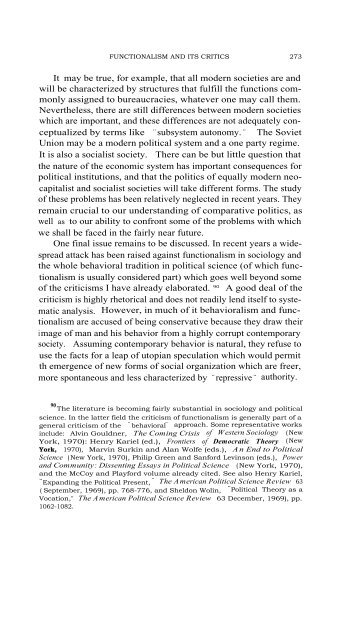FUNCTIONALISM AND ITS CRITICS - Intercollegiate Studies Institute
FUNCTIONALISM AND ITS CRITICS - Intercollegiate Studies Institute
FUNCTIONALISM AND ITS CRITICS - Intercollegiate Studies Institute
Create successful ePaper yourself
Turn your PDF publications into a flip-book with our unique Google optimized e-Paper software.
<strong>FUNCTIONALISM</strong> <strong>AND</strong> <strong>ITS</strong> <strong>CRITICS</strong> 273<br />
It may be true, for example, that all modern societies are and<br />
will be characterized by structures that fulfill the functions commonly<br />
assigned to bureaucracies, whatever one may call them.<br />
Nevertheless, there are still differences between modern societies<br />
which are important, and these differences are not adequately conceptualized<br />
by terms like " subsystem autonomy. " The Soviet<br />
Union may be a modern political system and a one party regime.<br />
It is also a socialist society. There can be but little question that<br />
the nature of the economic system has important consequences for<br />
political institutions, and that the politics of equally modern neocapitalist<br />
and socialist societies will take different forms. The study<br />
of these problems has been relatively neglected in recent years. They<br />
remain crucial to our understanding of comparative politics, as<br />
well as to our ability to confront some of the problems with which<br />
we shall be faced in the fairly near future.<br />
One final issue remains to be discussed. In recent years a widespread<br />
attack has been raised against functionalism in sociology and<br />
the whole behavioral tradition in political science (of which functionalism<br />
is usually considered part) which goes well beyond some<br />
of the criticisms I have already elaborated. 90 A good deal of the<br />
criticism is highly rhetorical and does not readily lend itself to systematic<br />
analysis. However, in much of it behavioralism and functionalism<br />
are accused of being conservative because they draw their<br />
image of man and his behavior from a highly corrupt contemporary<br />
society. Assuming contemporary behavior is natural, they refuse to<br />
use the facts for a leap of utopian speculation which would permit<br />
th emergence of new forms of social organization which are freer,<br />
more spontaneous and less characterized by " repressive " authority.<br />
90 The literature is becoming fairly substantial in sociology and political<br />
science. In the latter field the criticism of functionalism is generally part of a<br />
general criticism of the " behavioral " approach. Some representative works<br />
include: Alvin Gouldner, The Coming Crisis of Western Sociology ( New<br />
York, 1970): Henry Kariel (ed.), Frontiers of Democratic Theory ( New<br />
York, 1970), Marvin Surkin and Alan Wolfe (eds.), An End to Political<br />
Science (New York, 1970), Philip Green and Sanford Levinson (eds.), Power<br />
and Community: Dissenting Essays in Political Science (New York, 1970),<br />
and the McCoy and Playford volume already cited. See also Henry Kariel,<br />
" Expanding the Political Present, " The American Political Science Review 63<br />
( September, 1969), pp. 768-776, and Sheldon Wolin, " Political Theory as a<br />
Vocation," The American Political Science Review 63 December, 1969), pp.<br />
1062-1082.
















